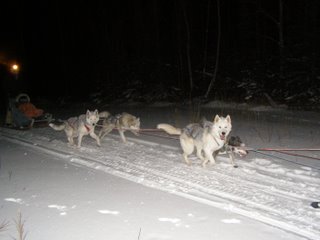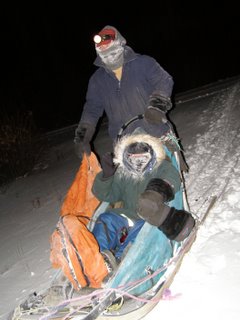Afterthoughts from the Yukon Quest 300A week has passed since the Quest 300 and many thoughts still go through my head about the whole experience. Most notably, did I do the right thing by scratching in Braeburn?? Invariably, the answer always comes back "YES" I scratched for a number of reasons, but first and foremost, is that I did not feel that we (myself and the dogs) were as prepared as we should be to complete the whole 300 mile race. After resting the dogs and myself I decided that we had had a great experience to this point, had stayed on the "upside" of the learning curve and most importantly the dogs finished as healthy as I possibly could make them. The vets were more than pleased with their condition and their recovery when our time to leave Braeburn was close, but I still chose to end the race on a happy note for all. We learned many valuable lessons from this experience, which will stand us in good stead in future racing and mushing adventures.
Experience shows me now that the dogs need more multiple runs back to back to get comfortable with the idea that we won't be returning to the yard or truck after two runs every time. I believe they would have gone to Carmacks and beyond had I asked them to, but I really was concerned about breaking their trust in me, something which I refuse to take chances on doing no matter what my personal goals are. There were a few minor injuries that were attended to, but with the excellent support and advice given from the Quest Vet Team, these were not obstacles that were insurmountable.
My own camp activities and logistics need some refining so that the dogs get maximum care and rest and I get the same. Practise, in this case, definitely makes perfect!!! I felt that it would be wiser for the whole teams sake to do some more training runs with camping breaks built in, to build these two elements of the sport to a higher level. Our tentative goal now is to train some more and run the percy De Wolfe race in Dawson (210 mile qualifier) in March.
A few other lessons stand out from the Quest 300, some of them are lessons I accomplished throughout training and in the race and some of them are lessons I will incorporate into my dog care and my mushing practices overall.
1: Don't try something new in a race without first practicing it in training. The new thermal underwear that Heathers parents sent prior to the race were not tested out before hand and as it turned out were considerably warmer than I had anticipated. Not that that was a problem, but had I tested them before the race I would have realized that I could have worn one less layer of the regular clothing I had been wearing. Pretty much throughout the first half of the run, I was running with my parka open to prevent sweating. Thanks so much Pat and Donald for that wonderfull gift, you can be assured they will spend many more miles on the trail.
2: Stick to training routines and speeds. I found that for at least the first 25 miles I had to be on the brake almost constantly due to fast hard trail conditions and the dogs excitement at the new trail and activity. After that they pretty much reverted to our somewhat slower training speeds on their own. It was very tempting to let them run faster for those first 25 miles, but I had been warned that this was not a good thing to do, especially in the first part of a longer race. Furthermore, because I wasn't sure how the dogs would do over multiple day runs, I wanted to remain on the conservative side till I could get a feel for how well the dogs were standing up after a day or two. As it turns out, it was good that I did this as I believe it is part of the reason the dogs were so well rested at the end of the mandatory rest in Braeburn. One of the vets actually mentioned that he felt that, given the dogs state of recovery at the end of the mandatory layover at Braeburn, I could have run the first stage at a faster speed. I am glad that I found that out by being conservative rather than the other way around and risking injuring or burning the dogs out because of inexperience.
3: Don't hesitate to drop a dog if you think something is wrong and don't know what it is. This lesson was driven home very hard at the start line when Fred had to be dropped from the team at the very last minute. We are still not sure what happened to Fred, possibly something neurological, but after I left the start area Heather realized that Fred was not very stable on his feet at all. In the excitement and activity of the start area, I might have mistaken Freds condition for the fact that Fred is often timid and maybe the excitement and commotion of the start area was overwhelming him. As it turns out, had I taken Fred, it is likely that I would have had to carry him in the sled almost all the way to Braeburn. Fred now lives inside the house, where he is warm and comfortable and will be assessed again by a vet very shortly to try to make a conclusive diagnosis of his condition and if possible a course of treatment.
I will continue this post shortly, but would like to close by saying a very heartfelt thanks to everyone who supported the team in this endeavor, without your support, emotionally, financially, and in all the other ways it was always there, this would not have been possible.

Photos: Courtesy of Darren Holcombe of Sarah and Bria resting at Braeburn, (above). Although young dogs and only into their first year of leading the team on a regular basis, Bria and Sarah performed brilliantly from Whitehorse to Braeburn ( as they also did during training). My biggest concern for them was the noise and activity level at the start area and in the starting chute, but Sarah and Bria went through the whole start routine (even being first out didn't phase them) without a hitch.
Hagrid, (below) finally lays down to sleep after 20 hours on his feet from Whitehorse to Braeburn. Hagrid had perfected the technique of sleeping on his feet during training and at camp from Whitehorse to Braeburn, but finally figured out that laying down worked better!!! This was a significant concern to me as Hagrid is a hard working dog and as we all know, rest is an important part of any sports activity, regardless if you are a human or canine athlete. I tried every trick in the book that I knew to teach Hagrid to lay down at rest points, during training, but to no avail. My next move at Braeburn would have been to leave Hagrid with my handlers so that he would get proper rest Hmm...I wonder if Hagrids offspring (12 of them) will be as tenacious about learning this lesson.

Labels: Why Scratch? Lessons learned.
















































